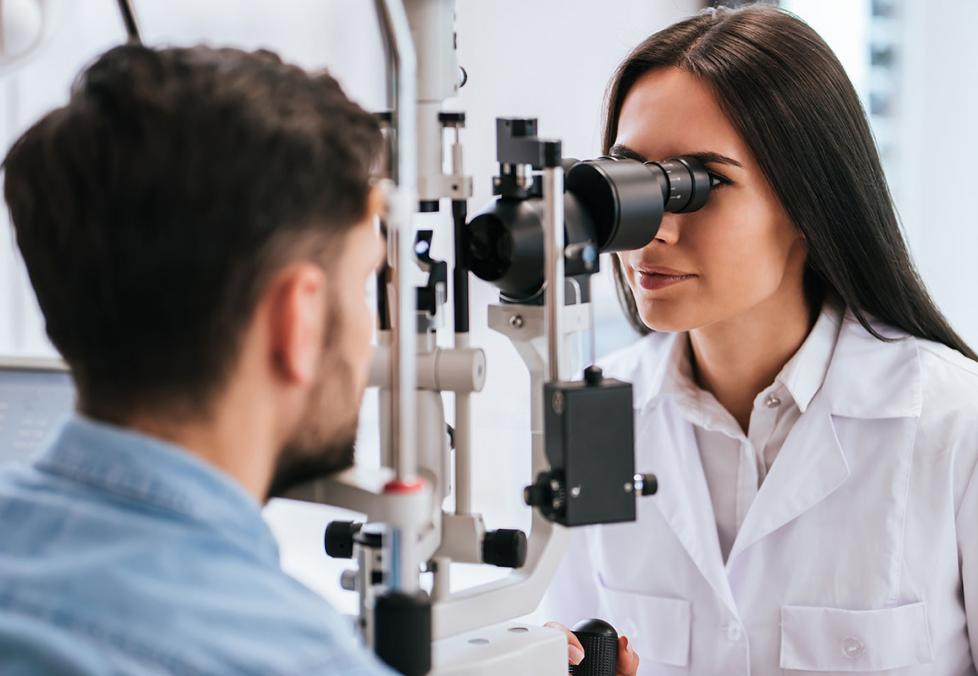
Treat your eyes to a free quality eye exam with our popular two-pair offer.
Everything you need to know to take care of your eyes — for life.
An eye exam at America’s Best gives you comprehensive care at an unbeatable price.

It’s easy to overlook the importance of good vision. But when it comes to your overall health, something as simple as getting an eye exam is right up there with eating right and staying active.
Just as you visit your family doctor for a yearly health check-up, you should also plan to visit your eye doctor for the same check-up for your eyes.
During an eye exam, your eye doctor will test your vision and prescribe corrective lenses, if needed. They will also do simple checks to look for the early signs of eye diseases and eye disorders.
Many eye problems don’t cause symptoms until they have advanced. Yet when eye problems are caught in the early stages, they’re often easier to treat. That makes getting a routine eye exam even more important.
Luckily, an eye exam at America’s Best is easy and affordable. Here’s what you can expect.
Has it been a while since your last eye checkup? Now’s the time to book an appointment!
An eye exam at America’s Best is designed to give you the most comprehensive care possible at an unbeatable price.
You can check in at the reception desk.
Ahead of your appointment, America’s Best will send you an email confirmation and appointment reminder that includes a link to conveniently complete your electronic medical record at home.
This information helps the optometrist know a little more about you, including:
If you’d rather fill out a form in person, we ask that you arrive a few minutes before your appointment to complete the necessary paperwork.
If you are a returning customer but have experienced changes to any of these since your last visit, be sure to tell the receptionist.
Press play to learn more about how to prepare for your eye exam:
There will be a short wait before you are taken into the pretest room. Here, the optician will administer a series of short tests, such as:
You won’t receive any results or comments about the tests at this point. The results are given to your doctor directly.
Press play to learn more about the pretest experience:
After your pretest, you will see the doctor. The process varies from this point depending on what kind of exam you’re getting: one for eyeglasses or one for contact lenses. Learn more about the difference between the two exams. If you are getting contacts, you will likely need to schedule a follow-up exam before your prescription is finalized.
Even if you don’t need eyeglasses or contacts, your optometrist will examine your eyes to check for signs of any eye diseases or problems.
Here’s a peek at what happens during an eye exam:
If you need corrective lenses, an associate can help you decide whether glasses or contacts are right for you. Then, they will help you select your eyeglasses or contacts.
If you need progressive lenses, you’ll be fitted for them after your exam.
Before you leave, you’ll pay for your eyewear and exam. If you order eyeglasses, you will be given an estimate on their arrival, usually 7 to 10 business days.
Press play for expert tips on finding the best glasses for your face:
If you have any other questions about what to expect during or after your eye exam, please don’t hesitate to contact the store and ask an associate. Find the store closest to you!
If your optometrist suspects you may have an eye disease, they will either treat the condition or refer you to an ophthalmologist, depending on the disease. Ophthalmologists are better suited to treat and manage more serious eye conditions. Your optometrist and ophthalmologist will work together to correct your vision and maintain your eye health.
Start now making your eye health a priority by scheduling an eye exam online.

Treat your eyes to a free quality eye exam with our popular two-pair offer.
Many people question who they should see for their annual eye exams. Is one doctor better than the other for preventative eye care health? Here’s the difference between optometrists and ophthalmologists.
Optometrist
An optometrist must complete four years of post-graduate education through optometry school. Upon graduation, they hold the title of Doctor of Optometry. For most people, the optometrist is the main doctor seen for eye care issues including getting contact lens and eyeglass prescriptions. They should be the first source for any eye health issues.
In addition to performing eye exams for vision issues, an optometrist may also identify more serious eye conditions such as glaucoma, cataracts or macular degeneration. If these conditions are found, your optometrist will either treat the condition or refer you to an ophthalmologist, depending on the disease
Ophthalmologist
An ophthalmologist is a medical doctor who specializes in eyecare. After graduating medical school, they receive additional training based on their specialty. While an ophthalmologist can also perform routine eye exams and prescribe eyeglasses and contact lenses, most choose to focus on their specialized area of advanced eye care. Specializations may include diabetic eye care, eye surgery or pediatric eye care.
For some with conditions such as glaucoma, an annual exam with an ophthalmologist is recommended. Otherwise, the optometrist should be your first visit when you notice eye problems.
To put it simply, seeing an ophthalmologist first would be like going to a surgeon when you have a sore throat. While there may be a condition causing the sore throat that will require the expertise of the surgeon, your first stop should be with your family doctor who can examine you to make that decision.
You should schedule an annual eye exam with an optometrist. Even if you have 20/20 vision, an eye exam is an important part of your preventative care plan.
Your eye doctor can shine a light on your overall health. When they look into your eyes, they may spot signs of diseases far from the eyes themselves, including:
If you suspect an eye issue or you notice your vision has changed, don’t wait for your annual appointment. Call your optometrist to schedule an appointment right away.
Press play to learn why it’s important to get your eyes checked, even if you don’t wear glasses or contact lenses:
Related Articles & Videos:
The America’s Best Guide to Eye Exams
Your Eyeglasses Prescription Explained
What to Know About Contact Lens Prescriptions
Your Eye Exam Revealed an Eye Disease. Now What?